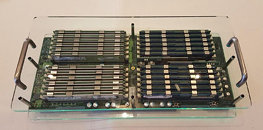Thursday, December 17th 2015
Rambus Explores Future Memory Systems
Rambus Inc. (NASDAQ: RMBS) today announced it will collaborate with Microsoft researchers in the exploration of future memory requirements for quantum computing. The expertise of Rambus in high-bandwidth, power-efficient memory architectures, combined with Microsoft researchers' knowledge of advanced system and data center design will be applied to drive new technology platforms.
"Existing computer architectures are reaching limits due to the ever increasing demands of real-time data consumption, which is driving the need to explore new high-performance, energy-efficient computer systems," said Gary Bronner, vice president of Rambus Labs. "By working with Microsoft on this project, we can leverage our vast expertise in memory systems to identify new architectural models.""We've been investing in projects that advance our understanding of quantum computing along with its applications and implementation," said Douglas Carmean, Architect, Quantum Architectures and Computation Microsoft Research. "We are focusing on exploring theoretical and experimental approaches to creating quantum computers, designing software, hardware and other elements that support our research and direction. In this process, we are engaging with partners that have critical expertise, such as Rambus, to build new types of computing platforms."
Rambus has a long history of researching and exploring emerging platforms, developing meaningful technologies with broad applicability. As part of this program, Rambus and Microsoft will pool resources to further examine potential architectures that can greatly enhance memory capabilities in various settings to improve overall system performance. Specific details of the project are confidential.
"Existing computer architectures are reaching limits due to the ever increasing demands of real-time data consumption, which is driving the need to explore new high-performance, energy-efficient computer systems," said Gary Bronner, vice president of Rambus Labs. "By working with Microsoft on this project, we can leverage our vast expertise in memory systems to identify new architectural models.""We've been investing in projects that advance our understanding of quantum computing along with its applications and implementation," said Douglas Carmean, Architect, Quantum Architectures and Computation Microsoft Research. "We are focusing on exploring theoretical and experimental approaches to creating quantum computers, designing software, hardware and other elements that support our research and direction. In this process, we are engaging with partners that have critical expertise, such as Rambus, to build new types of computing platforms."
Rambus has a long history of researching and exploring emerging platforms, developing meaningful technologies with broad applicability. As part of this program, Rambus and Microsoft will pool resources to further examine potential architectures that can greatly enhance memory capabilities in various settings to improve overall system performance. Specific details of the project are confidential.

18 Comments on Rambus Explores Future Memory Systems
I'm not trying to be critical, but has this company done anything that isn't a flop? How are they still alive?
Because that is more than likely what they are doing.
GDDR5 has more bandwidth then DDR3/4 but higher latency so its good for moving big chunks of data but the smaller the chunks get the more latency impacts its performance.
DDR3 and 4 have less bandwidth but lower latency so they are better with the smaller chunks(more general).
HBM has better latency than GDDR5 I think,
www.technologyreview.com/news/544421/googles-quantum-dream-machine/
And, by definition, how we supposed to implement HBM on RAM stick? Unless you bypass the stick altogether and just bolt the RAM directly into processors.
DEC never used rambus they wanted to but the cost was to much.
SGI looked into rambus but cost...
I think nintendo did on there N64 and intel did...
Other than that it was extremely expensive.
And rambus sued people for using and not using there tech....